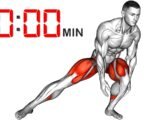
Can You Touch Your Fingers Behind Your Back? (BIG PROBLEM!)
December 29, 2021Can you touch your fingers behind your back? If not, then you need to watch this video. I’m going to show you how your poor shoulder flexibility is holding back your gains and making you more susceptible to injury on some of the most popular exercises.
It starts with the test.
This is called the Apley Scratch Test. To perform it, stand tall and reach one arm up and over your shoulder to try and touch as low down the shoulder blade as you can. With the other arm, reach behind your back and try to touch your fingers as far up your back as possible. Ideally, you would be able to touch your longest fingers together.
It is actually an acceptable result to at least be able to touch the top of your shoulder blade with your top hand and the bottom of your shoulder blade with your bottom hand. The problem is, 93% of the population cannot do this. That is a big problem.
The problems become magnified as I said, when you then go and perform some of the most popular lifts in the gym with this mobility deficit. Exercises like the bench press, lat pulldowns, bench dips, chest dips and even barbell rows are all compromised when you don’t have adequate range of motion of the shoulder joint which is precluding you from achieving the touching of the fingers behind your back.
From a biomechanical standpoint, the top arm needs to have shoulder flexion and external rotation range of motion while the bottom arm needs to have shoulder extension and internal rotation mobility. Most will struggle to get the bottom hand sufficiently up the back. A loss of internal rotation is a common side effect of muscle imbalance and adaptive stress of the shoulder.
Don’t worry if you don’t pass though. I’m going to show you three ways that you can improve this quickly.
The first is by concentrating on unshrugging your shoulders whenever you do any of the exercises listed above. Instead of forcing your shoulder blades down and back, which can lead to an artificial pinching of the scapula together, just concentrate on keeping your shoulders down and unshrugged. This will take care of the shoulder blades and make it easier to keep the joint stable, preventing them from tipping forward into a dysfunctional anterior tilt.
The second thing you can do is include a sleeper stretch into your mobility routine. This will help to eliminate glenohumeral internal rotation deficit or GIRD. The key is making sure to keep the head of the humerus down to accurately assess the loss of range into internal rotation and to keep the stretch where it needs to be. Letting your shoulder pop up is only going to trick you into thinking you have more motion than you do and won’t help you to fix this problem long term.
The third thing you want to do is use either a band or a door knob to perform the test as a corrective exercise. Either hang the band over the pull-up bar and reach behind your back to grab it or stand in front of a door and reach behind you to grab the knob. In either case, from here you want to squat or alter your body in space to deepen the stretch on the shoulders and let the arm rise higher behind the back.
Try these out and I promise you that even if you can’t touch your fingers behind your back right now, you will be able to in no time.
If you are looking for a complete training system where mobility matters just as much as your muscle gains (because staying healthy long term depends on it), be sure to visit athleanx.com via the link below and check out the workout programs. Start training like an athlete today and see just how fast you can feel better than ever, while looking your best ever.
For more videos on improving shoulder mobility and how to get rid of shoulder pain, be sure to subscribe to our channel here on youtube via the link below and remember to turn on your notifications so you never miss a new video when it’s published.
Build ripped athletic muscle here – http://athleanx.com/x/my-workouts
Subscribe to this channel here – http://bit.ly/2b0coMW



